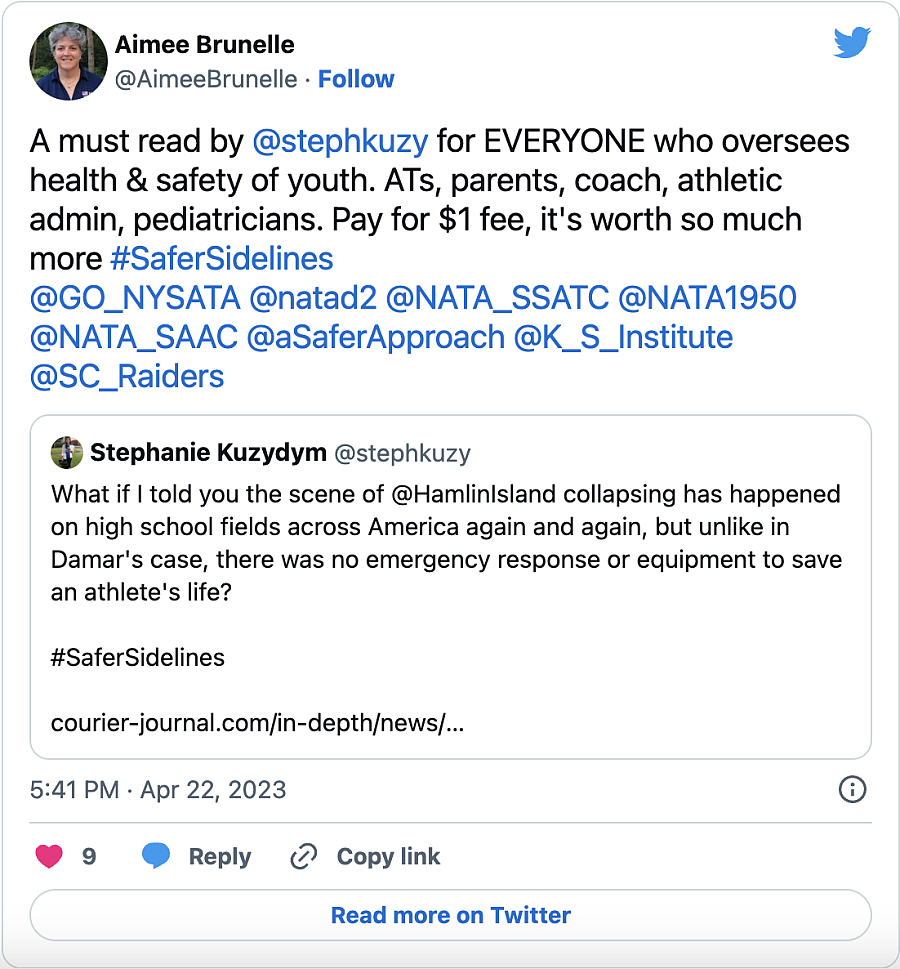Courier Journal's 'Safer Sidelines' driving conversation about athlete health, safety
The story was originally published in The Courier Journal with support from our 2022 Data Fellowship.
The Courier Journal's four-part series "Safer Sidelines," which investigated the health and safety of high school athletes, is driving a national conversation on the issue ahead of a free public event coming up at Spalding University.
Among its findings, the months-long project showed most states don't use sports medicine's gold standards for athlete safety, legislation to increase protections on sidelines is often watered down or defeated, and the cost to provide better health care to athletes is a small fraction of what is spent on athletics by school districts across the U.S.
"Safer Sidelines is the best and most impactful series I have encountered highlighting the risk associated with not prioritizing athlete health, safety and wellbeing," said Dr. James Borchers, a sports medicine physician at Ohio State University's Wexner Medical Center. "Athletic trainers, team physicians and others have been working to raise awareness regarding these issues, and this series reflects those concerns.
"This series accurately reflects the risk associated in athletics when best practices and standard of care are not followed."
Borchers is also president of the U.S. Council for Athletes' Health, an independent, third-party organization that works with athletic institutions ― such as the Big Ten Conference ― to advise on their health care delivery system.
Borchers played college football alongside Korey Stringer, who later collapsed and died during Minnesota Vikings training camp in 2001 from heat stroke. Stringer's wrongful death lawsuit funded the creation of the Korey Stringer Institute, which works to reduce sudden death in athletes through research and awareness.
"Safer Sidelines is a massive educational tool for populations that need the info in a palatable format ― athletic directors, coaches, principals, superintendents, risk managers, etc.," said Dr. Douglas Casa, the institute's CEO.
Everyone is welcome to attend a panel discussion on the project on May 17, 2023 at 6 p.m. at Spalding University's College Center Ballroom. The event will also be live streamed at courier-journal.com. To attend the event in person, register at courier-journal.com/safer.
The event will feature four panelists and will be moderated by The Courier Journal. The panelists will include:
- Kentucky High School Athletic Association commissioner Julian Tackett, who has worked with the association for nearly four decades.
- State Rep. Kim Moser, who worked on recent Kentucky sports safety legislation. Gov. Andy Beshear signed House Bill 331 into law in early May. It recommends external automated defibrillators (AEDs) be in middle and high schools “as funds become available.” Moser previously worked on bills related to AEDs in schools in 2017 and 2018.
- Alma Mattocks, program director for the Spalding University Master of Science in Athletic Training program. Spalding is one of four accredited professional masters athletic training programs remaining in Kentucky, down from six.
- Matthew Mangine Sr., co-founder of the Matthew Mangine Jr. “One Shot” Foundation, which was created to honor his son, who collapsed during soccer conditioning in June 2020.
Athletic trainers and parents both locally and nationally reacted to the project on social media and in emails.
"It nauseates me to think with a few affordable adjustments lives can be saved," one reader said in an email to The Courier Journal. "Can I bring a van with an ice maker and tub and sit on the sidelines? Can I bring AEDs? What can I do?!"
"I hope (Safer Sidelines) will help produce positive improvements to athletic safety," a Kentucky schools superintendent emailed The Courier Journal.

"These are powerful and well written," Becky Clifton, an athletic trainer in Indiana, said in an email. "I hope & pray that they get the attention of the appropriate people, and that changes occur."
Safer Sidelines described how lawmakers often present a strong bill, only to have it weakened through the legislative process. Since the project's debut, the same thing happened in Indiana with Senate Bill 369.
In February, a little more than a month after Damar Hamlin of the Buffalo Bills collapsed during Monday Night Football, Julie West sat at a table in front of a committee of legislators to tell them about her 16-year-old son, Jake, who collapsed of an undetected heart condition in 2013. The closest AED was in the coach's office.
For the next three months, West showed up at the Indiana Capitol, pushing for a bill to require AEDs on sports sidelines. Instead, Jake's Law will recommend schools have AEDs at athletic events where students have an increased risk of sudden cardiac arrest.
"This law will make a difference and lives will be saved," West said. "More work definitely needs to be done in our schools, but this is a start. We have their attention."
